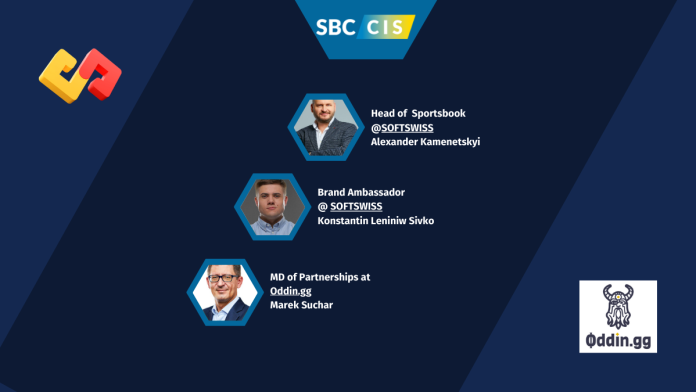Aleksander Kamenetsky, Head of Betting Company SOFTSWISS, and Marek Suchar, Managing Director of Partnerships at Oddin.gg, joined Konstantin Sivko, CS:GO streamer and commentator, and SOFTSWISS brand ambassador, for an exclusive roundtable for SBC.
The discussion focused on the analysis of the recent CS:GO tournament in Cologne, as well as recommendations for operators who plan to hold similar events in the coming months.
What matches tend to capture the most attention? How to predict which game will draw a larger audience?
Konstantin Leniniw Sivko (Brand Ambassador): Predicting interest in matches and tournaments is often a complex endeavour due to numerous influencing factors and variables involved. I would highlight team popularity, tournament status, match significance, playoff stage and championship timing.
Popular CS:GO teams draw a lot of attention to their matches, no matter what tournament or stage they play in. The most prominent example is NaVi. In 2022, their CS:GO lineup ranked third in total views among all teams in esports (74.44 million hours of viewing). FaZe and G2 were also in the top 10. Meanwhile, at the BLAST Premier Spring 2023 tournament, matches featuring NaVi exclusively dominated the top 5 slots in terms of views.
Another great example is local teams in the later stages of competitions. At IEM Rio Major in Brazil, the local team Furia advanced to the semi-finals, capturing attention as the most viewed team in the tournament by a solid margin (16.5 million hours vs 12.3 for the second place and only 10 million for the eventual champion).
The status of the tournament also plays a crucial role. For example, Major events supported by Valve, the game developer, consistently draw greater viewership than any other tournament, regardless of the competitiveness and participants involved.
For example, with only ~15% difference in on-air time (116h vs 101h), BLAST.tv Paris Major 2023 exceeded Cologne 2023’s viewing hours more than twofold (69.5M vs 29.9M).
Conversely, the IEM series tournaments held in Cologne and Katowice are expected to outperform the BLAST Premier Fall and even BLAST World Finals tournaments.
When considering the significance of individual matches, sometimes games occurring in the group stage can compete with matches in the later stages of play-offs. For example, let’s take the recent Blast Paris Major, wherein a clash between FaZe and NaVi took place during the group stage. This particular match secured the second-highest viewership peak (960,841) in the whole tournament and trailed behind only the Grand Final. It is noteworthy that even quarter-finals featuring FaZe vs Heroic, which has a higher overall rating than the FaZe vs NaVi match, took only the fifth place by viewership peak, with 866,323 views.
What do you think about the tournament in Cologne? How was it?
IEM Katowice and IEM Cologne stand as benchmarks for CS:GO tournaments, embodying the atmosphere that should pervade the stadium. For me personally, I find Cologne particularly appealing due to its larger arena and relaxed atmosphere. The statistics echo this sentiment: 23,503,319 hours of viewing time for Katowice vs 29,529,856 for Cologne.
The level of production inside the stadium, the immersive atmosphere, and the crowd collectively earn these events the moniker the ‘Counter-Strike Cathedral’ for good reason. This year, the organisers have artfully integrated the Cathedral theme into the opening of the Grand Final, enhancing the experience with captivating and conceptual videos featuring such stars as S1mple, Ropz, Perfecto, and SDY. Although it should be noted that BLAST viewers tend to appreciate the production values of online broadcasts slightly more (stream design, transitions, screensavers), it is the LAN events by ESL that hold an unparalleled position in terms of competition now.
Which tournaments are you advising betting companies to focus on in the next two months?
KLS: I definitely suggest to pay attention to the following tournaments:
- ESL Pro League is a global CS:GO league that has been held biannually since 2015. It brings together 32 best teams from all over the world and lasts for a month. Last season, 195 maps were contested in 58 Bo3 matches. For example, Cologne’s main stage features 74 maps, 30 Bo3 + 12 Bo3 in the play-in stage and 8 Bo1 in the first play-in stage.
- BLAST Premier Fall Final 2023 is a traditional big LAN event in Copenhagen, where 8 partner teams fight not only for a prize of USD 425,000 but also for a ticket to the Global Finals with a prize of USD 1,000,000.
- BLAST Premier World Final 2023 is a huge LAN that will be held in Abu Dhabi and will be the final chapter not only in the season but also in the history of the legendary game CS:GO, which lasted for 11 years. The prize pool is USD 1,000,000 for just the top 8 teams. It’s a real celebration of skill and luxury!
What matches tend to capture the most attention? How to predict which game will draw a larger audience?
Alexander Kamenetskyi (Head of SOFTSWISS Sportsbook): The common trend in betting is that players tend to bet on favourites to increase their chances of winning. However, we often see that in cybersports, players often do quite the opposite – they place their bets on underdogs.
In esports, this strategy is justified because, as opposed to traditional sports, outsiders tend to beat leaders more often. As a result, when it comes to promoting matches, a notable emphasis should be placed on the matchups between outsiders and favourites.
Other factors that we also suggest to consider are the popularity of tournaments and teams, player transfers, and historical context of particular matchups. For example, it is a great strategy to promote matches featuring regional teams within their home countries. These factors have a strong emotional influence on bettors and can increase wagering activity.
Please share any unusual moments you have noticed during IEM Cologne 2023.
AK: In terms of numbers, the tournament amassed 38% of the entire CS:GO Turnover throughout its duration (26 July – 6 August). At the same time, the GGR reached a remarkable level of 60% of the turnover due to the high margin percentage (21.3%). The intense level of excitement witnessed during IEM Cologne contributed to exceptional margins and enhanced the tournament’s profitability.
Furthermore, during the event, we observed a surge in interest, resulting in a corresponding increase in the number of bets during the playoff stage and the grand final. This phenomenon is largely attributed to the wide global reach of our projects, rather than some abnormal behaviour.
What key learnings can operators use in the future?
AK: The timing of IEM Cologne 2023 aligns with the resurgence of traditional sports, contributing to the heightened popularity of the event.
We continue to encourage operators to pay more attention to cybersports. CS:GO stands as the most sought-after discipline on our platform among esports. Counter-Strike: Global Offensive has exhibited an impressive 339% year-on-year surge in bets and a remarkable 388% increase in the Bet Sum on the SOFTSWISS Sportsbook in H1’23. These figures underscore an ongoing upward trajectory of cyber sports popularity among betters.
Coming back to the tournament, I can assume that stronger promotion of this and similar events, using special bonuses and strategies as mentioned earlier, should help attract new players and retain existing ones.
What matches tend to capture the most attention? How can you predict which game will draw a larger audience?
Marek Suchar (MD of Partnerships at Oddin.gg): Similar to such sports matchups like Real Madrid vs. Barcelona, the cultural context plays a crucial role in esports as well. Such factors as the nationality of the teams matched, historical rivalries, instances when a teammate switches teams and competes against their former fellows – all this sparks emotions and contributes to the anticipation of matches. This not only amplifies excitement among spectators, but also translates to higher betting volumes. Also, balanced matches in terms of team quality result in longer, engaging games with even rounds, appealing to the audience.
How was the tournament in Cologne? Have you noticed any unusual things?
MS: The absence of a second major in the second half of the year made Cologne the most prestigious tournament of this season. Given that it was the first big event of the season, we could observe a lot of inconsistencies between newly formed lineups. This tournament proved the absence of a distinct number-one team, revealing a competitive landscape with numerous contenders for the trophies.
Sadly it was the last ever CS:GO Cologne – we could witness a moment of silence for CS:GO ahead of the upcoming shift to Counter-Strike 2.2. That was a beautiful fan tribute to the legendary game title.
What key learnings can operators use in the future?
MS: In the early stages of the season, it’s essential to focus on the teams’ current performance rather than relying solely on preconceived expectations. Initial games often exhibit a touch of rawness, where favourites falter and lesser-known teams dare to challenge the odds. This underscores the importance of industry knowledge in making accurate predictions.
On the other hand, viewer interest centres not only around team quality but often revolves around the fanbases of individual players, particularly those who actively engage in streaming and have a strong influence.
The popularity of an individual or team, driven by streaming prowess or personal charm, or association with a strong sponsor brand that brings high-quality user activations create a disparity between popularity and actual performance.
Ultimately, dedication, training and teamwork are the ingredients that help win tournaments. While viewer engagement through streaming is valuable, it is the robust track record backed by data, combined with the aforementioned industry insight, that forms a bedrock for reliable predictions.
Don’t forget to subscribe to our Telegram channel!
Tags:











